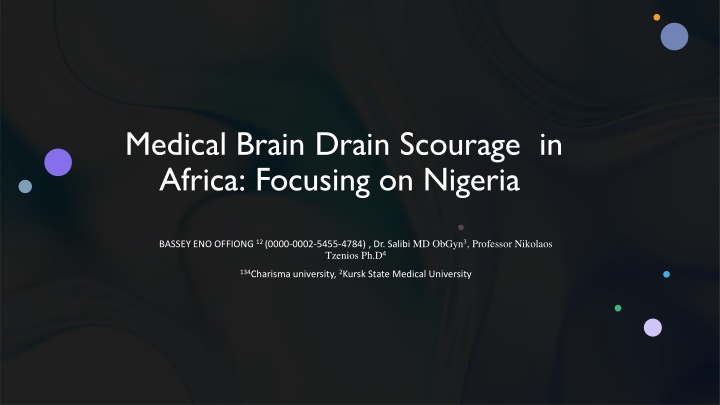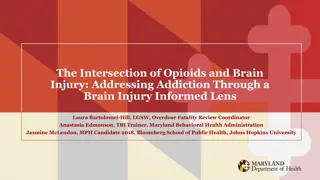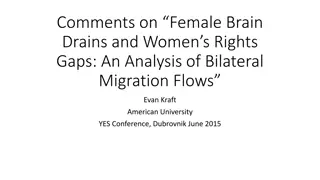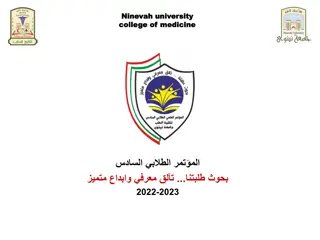Medical Brain Drain in Nigeria: Causes and Consequences
The challenges of brain drain in Nigeria, including factors driving healthcare professionals to emigrate and the implications on healthcare services and the economy. Recommendations for mitigating this issue are also discussed.
Download Presentation

Please find below an Image/Link to download the presentation.
The content on the website is provided AS IS for your information and personal use only. It may not be sold, licensed, or shared on other websites without obtaining consent from the author.If you encounter any issues during the download, it is possible that the publisher has removed the file from their server.
You are allowed to download the files provided on this website for personal or commercial use, subject to the condition that they are used lawfully. All files are the property of their respective owners.
The content on the website is provided AS IS for your information and personal use only. It may not be sold, licensed, or shared on other websites without obtaining consent from the author.
E N D
Presentation Transcript
Medical Brain Drain Scourage in Africa: Focusing on Nigeria BASSEY ENO OFFIONG12(0000-0002-5455-4784) , Dr. Salibi MD ObGyn3, Professor Nikolaos Tzenios Ph.D4 134Charisma university, 2Kursk State Medical University
outline Definition of concepts related to brain drain Recommendations to help slow the tide Background and cause of the problem Consequences of the problem
Definition of concepts related to brain drain brain drain : the migration of educated or professional individuals to a more developed nation, frequently in search of better salary or living conditions. brain gain: It is the gains gotten from the rise in the number of highly skilled people foreigners moving to a country due to better living and working conditions. brain waste: Describes the situation when qualified immigrants have a mismatch of skills and jobs
Currently, Nigeria has a doctor-to- patient ratio of 1:9,083, with most states having noticeably worse situations. In 2018 Over 4,000 Nigerian doctors are thought to be in active practice in the United States. Overview of the problem In an online survey conducted in nigeria showed that 9 In every 10 doctors are seeking work opportunities abroad No fewer than 20 doctors leave Nigeria every week
Causes of the problems Studies show that Nigerian brain drain is caused by a combination of internal and external factors. Internal factors These are the push factors that drive people to emigrate, such as a dearth of employment opportunities, a slow rate of economic growth, and subpar working and living conditions. External factors are the pull factors that entice professionals to immigrate to their country
Health consequences: increase in mortality rate an increase in the workload for remaining healthcare professionals reduce the availability of medical care for the population. Poor health care services Consequences of the problem Reduced quality of care Socio- economic costs Loss of Human Resources Higher costs loss of gross domestic product (GDP) and taxes to another country
government should increase budget allocation to science and medical sector the government should make policy changes to help rebuild the healthcare sector. Recommendations to help slow the tide Government should make efforts to reduce corruption and insecurity Exit interviews and questionnaires should be made mandatory for doctors resigning their jobs to migrate in order to investigate what will stop them Review of the Nigeria medical university curriculum
Conclusion Medical brain drain in Nigeria is a worrisome phenomenon that is severely harming the nation's general wellbeing by depleting the country of critically needed medic staff. It appears to be caused by a combination of economic instability, a lack of employment opportunities for health professionals, and an overall lack of career progression opportunities. As a result, the government must take action to maintain its medical staff in order to ensure that the country is prepared to offer medical care for its own inhabitants.
References 1. Cervantes, Mario; Guellec, Dominique (January 2002). The brain drain: old myths, new realities https://www.oecd- ilibrary.org/economics/oecd-observer_15615529 OECD Observer. Retrieved 2022-12-28 2. Baptiste, Nathalie (25 February 2014). "Brain Drain and the Politics of Immigration". Foreign Policy In Focus. Institute for Policy Studies. Retrieved 2022-12-28 3. Barker, Emily. (2020). The Economics of Brain Waste. 10.1007/978-3-030-40981-4_4. https://www.researchgate.net/publication/342980899_The_Economics_of_Brain_WasteRetrieved 2022-12-28 4. Lofters, A., Slater, M., Fumakia, N., & Thulien, N. (2014). "Brain drain" and "brain waste": experiences of international medical graduates in Ontario. Risk management and healthcare policy, 7, 81 89. https://doi.org/10.2147/RMHP.S60708. Retrieved 2022-12-28 5. Olurounbi, R. (2021, March 15). Nigeria Unemployment Rate Rises to 33%, Second Highest on Global List. Bloomberg. https://www.bloomberg.com/news/articles/2021-03-15/nigeria-unemploymentrate-rises-to-second-highest-on-global-list. Retrieved 2022-12-29 6. Onah, C.K., Azuogu, B.N., Ochie, C.N. et Al(2022) Physician emigration from Nigeria and the associated factors: the implications to safeguarding the Nigeria health system. Hum Resour Health 20, 85. https://doi.org/10.1186/s12960-022-00788-z retrieved 2022-12-28 7. Okafor, C. (2016). Improving Outcomes in the Nigeria Healthcare Sector through PublicPrivate Partnership. African Research Review, 10(4), 1 17. https://doi.org/10.4314/afrrev.v10i4.1 retrieved 2022- 12-30 8. Corruptions Perceptions Index 2020 for Nigeria. (2020). Transparency.Org. https://www.transparency.org/en/cpi/2020/index/ retrieved 2022-12-30 9. Moyosore, S. O. (2015). Corruption in Nigeria: Causes, Effects and Probable Solutions. International Institute of Academic Research and Development, 1(8), 22 36. https://www.transparency.org/en/cpi/2020/index/ retrieved 2022-12-30
References 10. Obokoh, A. (2020, January 9). Key issues to shape Nigeria s healthcare sector in 2020. Business day NG. https://businessday.ng/health/article/key-issues-to-shapenigerias-healthcare-sector-in-2020/ reserved 2022-12-31 11. Retrieved from https://www.ajol.info/index.php/ijdmr/article/viewFile/91304/80803 retrieved on 2022-12-31 Emeghara, E. E. (2013). Brain Drain as a Clog in the Wheel of Nigeria s Development: The University Education System in Focus. International Journal of Development and Management Review (INJODEMAR), Vol. 8, No 1, 110-121. 12. Okey, M. K. N. (2016). Corruption and Emigration of Physicians from Africa. Journal ofEconomic Development, 41(2), 27 52. https://doi.org/10.35866/caujed.2016.41.2.002 13. https://scholarworks.waldenu.edu/cgi/viewcontent.cgi?article=12099&context=dissertations Oluwakemi Osigbesan (2021). Medical Brain Drain and its Effect on the Nigerian Healthcare Sector. ScholarWorks WaldenUniversity retrieved December 24th 2022 from 14. Central (PMC). Retrieved January 5, 2023, from https://www.ncbi.nlm.nih.gov/pmc/articles/PMC8439958/ Adebayo, A., & Akinyemi, O. O. (2021, September 15). What Are You Really Doing in This Country? : Emigration Intentions of Nigerian Doctors and Their Policy Implications for Human Resource for Health Management. PubMed 15. Kamarulzaman, A., Ramnarayan, K., & Mocumbi, A. O. (2022, October 27). Plugging the medical brain drain. PubMed Central (PMC). Retrieved January 5, 2023, from https://www.ncbi.nlm.nih.gov/pmc/articles/PMC9612885/ 16. NTI2M/BRAIN_DRAIN_IN_THE_HEALTH_SECTOR_IN_AFRICA_EXAMPLES_FROM_powerpoint_ppt_presentation BRAIN DRAIN IN THE HEALTH SECTOR IN AFRICA: EXAMPLES FROM. PowerShow. Retrieved January 5, 2023, from https://www.powershow.com/view/3b2633- 17. pandemic and health workforce brain drain in Nigeria. PubMed Central (PMC). Retrieved December 23, 2022, from https://www.ncbi.nlm.nih.gov/pmc/articles/PMC9724397/ Lawal, L., Lawal, A. O., Amosu, O. P., Muhammad-Olodo, A. O., Abdulrasheed, N., Abdullah, K. U. R., Kuza, P. B., Aborode, A. T., Adebisi, Y. A., Kareem, A. A., Aliu, A., Elelu, T. M., & Murwira, T. (2022, December 5). The COVID-19 18. Retrieved December 23 2022 Schrecker, Ted & Labont , Ronald. (2004). Taming the Brain Drain: A Challenge for Public Health Systems in Southern Africa. International journal of occupational and environmental health. 10. 409-15. 10.1179/oeh.2004.10.4.409.























